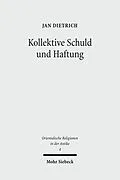Jan Dietrich provides a comprehensive history and analysis of the 'scapecow' ritual in Deuteronomy 21:1-9, comparing it to its religious and judicial parallels from both the ancient Near East and the Bible, using historical methods from exegesis, cultural anthropology and comparative law.
The 'scapecow' ritual in Deuteronomy 21:1-9 is a central but almost unknown type of scapegoat ritual of the Hebrew Bible. In the case of a homicide caused by an unknown perpetrator, the parallels from ancient Near Eastern legal texts demand collective legal liability, while in the Deuteronomy passage a young cow is ritually killed as a substitute for the liability of the community. This is, according to Girard's and Burkert's perspectives, the genuine form of a scapegoat ritual, since the heifer is ritually killed, not merely sent into the wilderness. Thus the question arises: Is the violence of this ritual meant to resolve the violence of the homicide to unburden Israel from the demands of its collective guilt? To answer this question, the author provides a comprehensive history and analysis of this text, comparing it to its religious and judicial parallels from both the ancient Near East and the Bible, using historical methods from exegesis, cultural anthropology and comparative law.
Autorentext
Born 1974; Professor of Old Testament Literature and Religious History at the University of Bonn.
The 'scapecow' ritual in Deuteronomy 21:1-9 is a central but almost unknown type of scapegoat ritual of the Hebrew Bible. In the case of a homicide caused by an unknown perpetrator, the parallels from ancient Near Eastern legal texts demand collective legal liability, while in the Deuteronomy passage a young cow is ritually killed as a substitute for the liability of the community. This is, according to Girard's and Burkert's perspectives, the genuine form of a scapegoat ritual, since the heifer is ritually killed, not merely sent into the wilderness. Thus the question arises: Is the violence of this ritual meant to resolve the violence of the homicide to unburden Israel from the demands of its collective guilt? To answer this question, the author provides a comprehensive history and analysis of this text, comparing it to its religious and judicial parallels from both the ancient Near East and the Bible, using historical methods from exegesis, cultural anthropology and comparative law.
Autorentext
Born 1974; Professor of Old Testament Literature and Religious History at the University of Bonn.
Titel
Kollektive Schuld und Haftung
Untertitel
Religions- und rechtsgeschichtliche Studien zum Sündenkuhritus des Deuteronomiums und zu verwandten Texten
Autor
EAN
9783161605932
Format
E-Book (pdf)
Hersteller
Genre
Digitaler Kopierschutz
Adobe-DRM
Dateigrösse
2.89 MB
Anzahl Seiten
481
Lesemotiv
Unerwartete Verzögerung
Ups, ein Fehler ist aufgetreten. Bitte versuchen Sie es später noch einmal.
